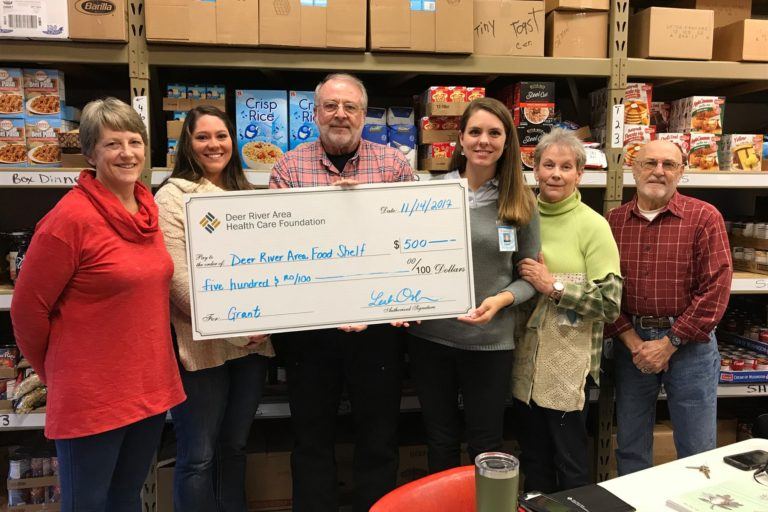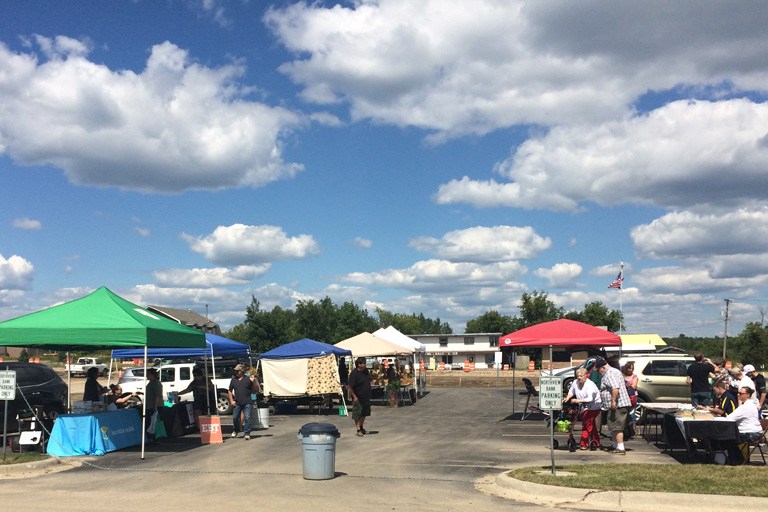Deer River Area Health Care Foundation

Keeping Health Care Local
Deer River, Minnesota, is in Itasca County and has a population of about 1,000. “It’s a small, very tight-knit community that has a strong sense of identity and people willing to invest in its future,” said Leah Oslin, the executive director of the Deer River Area Health Care Foundation.
“The process of doing a business plan helped us to put down specific goals and a road map to get there.”
Leah Olsin, Executive Director, Deer River Area Health Care Foundation
One example of that investment is the community’s commitment to keeping health care local. Deer River’s hospital was a grassroots effort led by the Deer River Women’s Club in the 1950s. In 2012, Deer River HealthCare Center integrated with Essentia Health, which community to keep a local health care center while accessing the resources of a larger health system. The next closest hospital in in Grand Rapids, a 20-minute drive away.
A Holistic Approach to Wellness
The Deer River Area Health Care Foundation’s goal is to serve its community by identifying and responding to needs regarding the health and well-being of its residents. This means more than simply access to health care, although it does make health care related grants and provides scholarships to local Essentia Health staff. According to research by the Robert Wood Johnson Foundation, 80% of a person’s health is determined by factors outside of the health care setting.

The foundation is acting upon that research to improve community health from all angles. “For us, this means investing in things like access to affordable healthy food, fresh produce, and physical activity,” said Leah. “We’ve supported access to local food through grants to the food shelf and the regional food bank with fresh produce grants.” In addition, the foundation is partnering in the startup of a community garden for Deer River, as well as a weekly farmers market, where people can now use their EBT cards. “Every $1 swiped on an EBT card will give people $3 for fresh local food,” said Leah.
Additionally, this small community is coming together to establish a wellness center for the Deer River Area. It will provide comprehensive health services, including a fitness center, mental health services, access to food, city and tribal offices, and a community center. “We don’t currently have anything like it in the Deer River area. The Wellness Center will be a wonderful asset for the community,” said Leah.
Social Enterprise: Learning Together
Propel Nonprofits has a long-standing partnership with Blandin Foundation in Itasca County. With their support, we’ve hosted several trainings and cohort gatherings. Leah has participated in several of those trainings, as well as an executive director cohort and our latest social enterprise cohort. The social enterprise cohort, supported by Northwest Area Foundation as well as Blandin, brought together six nonprofits from across Itasca County who were thinking about social enterprise or looking to improve an existing one.
For Leah, this was an opportunity for Deer River Area Health Care Foundation to evaluate how the hospital’s social enterprise gift shop could be a greater benefit to their overall mission; the gift shop is volunteer run, and profits flow to a fund under the umbrella of the foundation to support health and wellness initiatives in the community.
“There were a number of benefits from the social enterprise cohort,” said Leah. “I was able to work with Sheila Rae Maki, our Volunteer Coordinator and Gift Shop Manager, and Chris and Janet at Propel Nonprofits to get the gift shop and its volunteers on QuickBooks – Sheila has over 40 years of experience in health care, but learned a lot herself about the business side through the cohort. Also, the process of doing a business plan helped us to put down specific goals and a road map to get there.”
Toward the goal of generating more income through the gift shop for the Deer River Area Health Care Foundation, they purchased a new point of sale system that now allows employees to use their employee badges to pay for gift shop items, gift shop items, such as clothing, accessories or greeting cards. “We estimate that will increase our sales by 15%, which is a conservative guess,” said Leah. “It adds up when you have 300 employees on site any given day.”
Advice from the Field
Leah’s advice to other nonprofits thinking about a social enterprise model: “Your board of directors needs to own it and be fully behind it. Once you have the blessing of the board to even explore it, having some champions who can take that on and lead it are important.”
In addition, she said many participants started with the perception that a social enterprise will be a silver bullet, but many realized through the cohort that what may be intended to feed their mission might end up being a distraction.
Last, she encourages others to use available resources, including Propel Nonprofits: “We’ve been so pleased with the resources offered to us in our rural community because it’s difficult to travel to Minneapolis for trainings, both in terms of time and money. It’s been invaluable to have these Propel Nonprofit trainings and cohorts offered in Itasca County. All of it has been time well spent. After each training, we walk away not only with new knowledge, but new connections.”
You can learn more about Deer River Area Health Care Foundation on its website.
